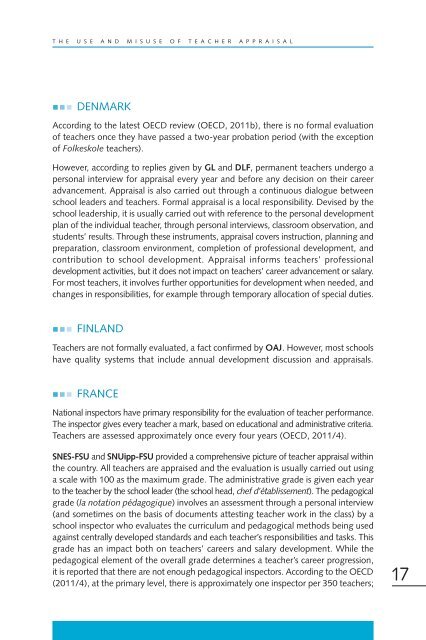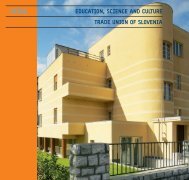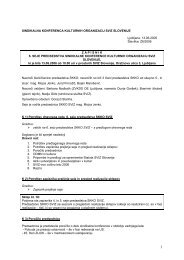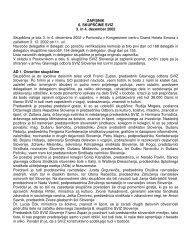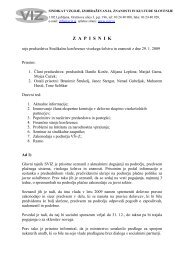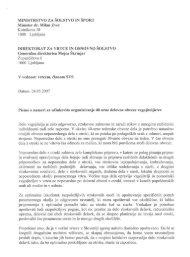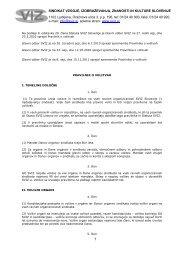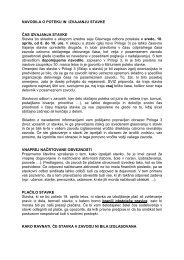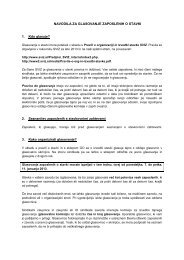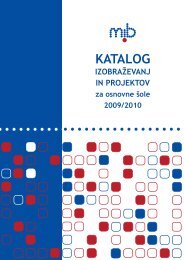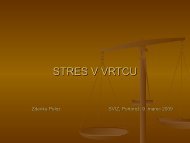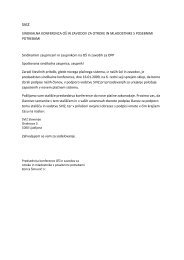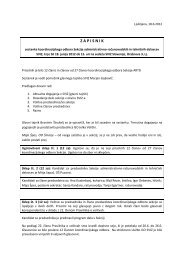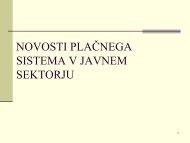The use and misuse of teacher appraisal - Education International
The use and misuse of teacher appraisal - Education International
The use and misuse of teacher appraisal - Education International
You also want an ePaper? Increase the reach of your titles
YUMPU automatically turns print PDFs into web optimized ePapers that Google loves.
T H E U S E A N D M I S U S E O F T E A C H E R A P P R A I S A L<br />
DENMARK<br />
According to the latest OECD review (OECD, 2011b), there is no formal evaluation<br />
<strong>of</strong> <strong>teacher</strong>s once they have passed a two-year probation period (with the exception<br />
<strong>of</strong> Folkeskole <strong>teacher</strong>s).<br />
However, according to replies given by GL <strong>and</strong> DLF, permanent <strong>teacher</strong>s undergo a<br />
personal interview for <strong>appraisal</strong> every year <strong>and</strong> before any decision on their career<br />
advancement. Appraisal is also carried out through a continuous dialogue between<br />
school leaders <strong>and</strong> <strong>teacher</strong>s. Formal <strong>appraisal</strong> is a local responsibility. Devised by the<br />
school leadership, it is usually carried out with reference to the personal development<br />
plan <strong>of</strong> the individual <strong>teacher</strong>, through personal interviews, classroom observation, <strong>and</strong><br />
students’ results. Through these instruments, <strong>appraisal</strong> covers instruction, planning <strong>and</strong><br />
preparation, classroom environment, completion <strong>of</strong> pr<strong>of</strong>essional development, <strong>and</strong><br />
contribution to school development. Appraisal informs <strong>teacher</strong>s’ pr<strong>of</strong>essional<br />
development activities, but it does not impact on <strong>teacher</strong>s’ career advancement or salary.<br />
For most <strong>teacher</strong>s, it involves further opportunities for development when needed, <strong>and</strong><br />
changes in responsibilities, for example through temporary allocation <strong>of</strong> special duties.<br />
FINLAND<br />
Teachers are not formally evaluated, a fact confirmed by OAJ. However, most schools<br />
have quality systems that include annual development discussion <strong>and</strong> <strong>appraisal</strong>s.<br />
FRANCE<br />
National inspectors have primary responsibility for the evaluation <strong>of</strong> <strong>teacher</strong> performance.<br />
<strong>The</strong> inspector gives every <strong>teacher</strong> a mark, based on educational <strong>and</strong> administrative criteria.<br />
Teachers are assessed approximately once every four years (OECD, 2011/4).<br />
SNES-FSU <strong>and</strong> SNUipp-FSU provided a comprehensive picture <strong>of</strong> <strong>teacher</strong> <strong>appraisal</strong> within<br />
the country. All <strong>teacher</strong>s are appraised <strong>and</strong> the evaluation is usually carried out using<br />
a scale with 100 as the maximum grade. <strong>The</strong> administrative grade is given each year<br />
to the <strong>teacher</strong> by the school leader (the school head, chef d’établissement). <strong>The</strong> pedagogical<br />
grade (la notation pédagogique) involves an assessment through a personal interview<br />
(<strong>and</strong> sometimes on the basis <strong>of</strong> documents attesting <strong>teacher</strong> work in the class) by a<br />
school inspector who evaluates the curriculum <strong>and</strong> pedagogical methods being <strong>use</strong>d<br />
against centrally developed st<strong>and</strong>ards <strong>and</strong> each <strong>teacher</strong>’s responsibilities <strong>and</strong> tasks. This<br />
grade has an impact both on <strong>teacher</strong>s’ careers <strong>and</strong> salary development. While the<br />
pedagogical element <strong>of</strong> the overall grade determines a <strong>teacher</strong>’s career progression,<br />
it is reported that there are not enough pedagogical inspectors. According to the OECD<br />
(2011/4), at the primary level, there is approximately one inspector per 350 <strong>teacher</strong>s;<br />
17


